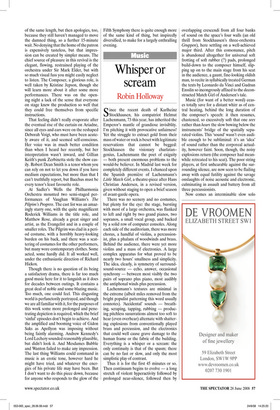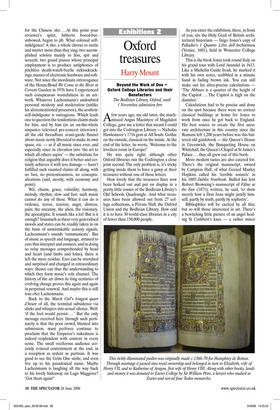Whisper or scream
Robin Holloway
Since the recent death of Karlheinz Stockhausen, his compatriot Helmut Lachenmann, 73 this year, has inherited the Emperor’s mantle of grandiose invisiblity. I’m pitching it with provocative unfairness! Yet the struggle to extract gold from their mass of water or rock is beset with legitimate reservations that cannot be begged: Stockhausen the visionary charlatan– genius, Lachenmann the poet of exiguity — both present enormous problems to the would-be believer. In Madrid last week for completely different events, I chanced upon the Spanish première of Lachenmann’s Little Match Girl, a theatre-piece after Hans Christian Andersen, in a revised version, given without staging to open a brief season of avant-garde opera.
There was no scenery and no costumes, but plenty for the eye: the stage, bursting with most of a large orchestra, was flanked to left and right by two grand pianos, two sopranos, a small vocal group, and backed by a solid row of computer consoles. Along each side of the auditorium, there was more chorus, a handful of violins, a percussionist, plus a phalanx of woodwinds and brass. Behind the audience, there were yet more violins and a mass of electronics. A large complex apparatus for what proved to be nearly two hours’ smallness and simplicity. The idea, clearly, is symmetry of surroundsound-source — echo, answer, occasional synchrony — between most visibly the two pairs of soprano plus piano, most audibly the antiphonal winds plus percussion.
Lachenmann’s textures are minimal in the extreme (albeit miles removed from the bright populist patterning this word usually connotes). ‘Accidental’ sounds — breathing, scraping, tapping, rubbing — producing pitchless susurrations almost too soft to hear (even overhear) alternate with shattering explosions from conventionally played brass and percussion, and the electronics that could well cause grave damage to the human frame or the fabric of the building. Everything is a whisper or a scream: the only continuity is that of the spasm; there can be no fast or slow, and only the most simplistic play of contrast.
Thus it is for the first 45 minutes or so. Then continuum begins to evolve — a long stretch of violent hyperactivity followed by prolonged near-silence, followed then by overlapping crescendi from all four banks of sound on the space’s four walls (an old thrill from Stockhausen’s three-orchestra Gruppen), here settling on a well-achieved major third. After this consonance, pitch is abandoned altogether for universal soft frotting of soft rubber (?) pads, prolonged build-down to the composer himself, slipping up on to the main stage from his seat in the audience, a gaunt, fine-looking oldish man, to recite in syllabically treated German the texts by Leonardo da Vinci and Gudrun Ensslin so incongrously affixed to the deconstructed Match Girl of Andersen’s tale.
Music (for want of a better word) ceases totally save for a distant whirr as of central heating, behind the long duration of the composer’s speech: it then resumes, chastened, so excessively soft that one sees rather than hears the slow bowing below the instruments’ bridge of the spatially separated violins. This ‘sound’ wasn’t even audible enough to be subliminal: it’s an ‘idea’ of sound rather than the corporeal actuality, however faint. Soon, though, the noisy explosions return (the composer had meanwhile retreated to his seat). The poor string players, at first unhearable against the surrounding silence, are now seen to be flailing away with equal futility against the savage onslaughts of noise acoustic and electronic, culminating in assault and battery from all three percussionists.
Now comes an interminable slow solo for the Chinese sho ... At this point your reviewer’s spirit, hitherto bored-butunbowed, began to jib. What colossal selfindulgence! A sho; a whole chorus to rustle and mutter more than they sing; two accomplished soloists mainly to hiss, spit and screech; two grand pianos whose principal employment is to produce antiphonies of pitchless death-watch-beetle ticktocktackings; masses of electronic hardware and software. Not since the inordinate extravagance of the Henze/Bond We Come to the River at Covent Garden in 1976 have I experienced such conspicuous wastefulness in an artwork. Whatever Lachenmann’s undoubted personal modesty and moderation (unlike his aforementioned precursor), the aesthetic self-indulgence is outrageous. Which leads one to question the tendentious claims made for him, and by him (in an on-the-whole simpatico televised pre-concert interview): all the old threadbare avant-garde flannel about music newly liberated to make its own space, etc. — as if all music since ever, and especially since its elevation into ‘the art to which all others aspire’ — the substitute for religion that arguably does it better and certainly achieves it with less damage — hasn’t fulfilled such vaunted claims all along, with no fuss, no pretentiousness, no conceptualisations (and, mostly, with economy and point).
Wit, charm, grace, volatility; harmony, melody, rhythm; slow and fast; such music cannot do any of these. What it can do is violence, terror, tension, angst, distress, pain; the uncanny, the alien, the visionary, the apocalyptic. It sounds like a lot! But is it enough? Inasmuch as these very generalised moods and states can be readily taken in on the basis of unmistakable sensory signals, Lachenmann’s sounds ‘communicate’. But of music as speech and language, attuned to ears that interpret and connect, and in doing so relay messages comprehended by head and heart (and limbs and loins), there is left the mere residue. Ears can be stretched and surprised and changed in extraordinary ways: thence can thus the understanding to which they form music’s sole channel. The history of the art down its long centuries of evolving change proves this again and again in perpetual renewal. And maybe this is still true chez Lachenmann.
Back to the Match Girl’s longest quart d’heure of all, the terminal subsidence via clicks and whispers into actual silence. Well: ‘if the fool would persist ... ’ But the only message received here through such pertinacity is that the poor crowd, blunted into submission, must perforce continue to proclaim that the Emperor’s nakedness is indeed resplendent with content in every sense. The small vociferous audience certainly evinced contentment at the end, in a reception as ardent as partisan. It was good to see the Grim One smile; and even live up to his paradoxical name. Maybe Lachenmann is laughing all the way back to his lovely hideaway on Lago Maggiore? ‘Got them again!’



















































































 Previous page
Previous page